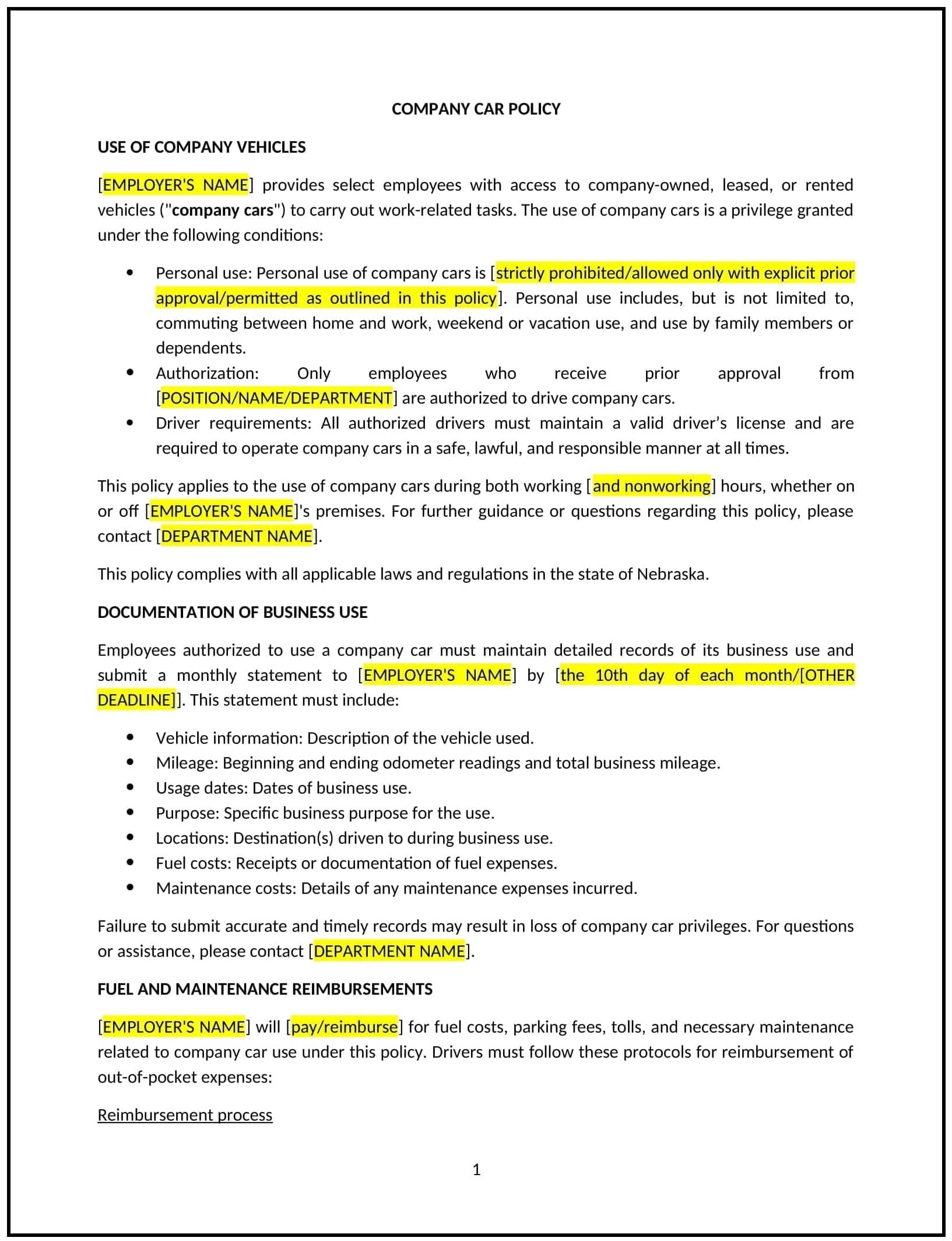Got contracts to review? While you're here for policies, let Cobrief make contract review effortless—start your free review now.

Customize this template for free
Company car policy (Nebraska)
A company car policy helps Nebraska businesses establish clear guidelines for employees who are provided with a company car for business use. This policy outlines the responsibilities of employees when using the company car, the types of vehicles eligible, and the procedures for maintaining and operating company vehicles. It also addresses personal use, insurance coverage, and other expectations regarding the use of company cars. The goal of this policy is to protect the business’s assets, ensure employee safety, and define the terms of use to avoid misunderstandings.
By adopting this policy, businesses in Nebraska can manage company vehicles effectively, ensure proper maintenance and use, and provide clear expectations for employees.
How to use this company car policy (Nebraska)
- Define eligibility: Specify which employees are eligible for a company car, including the type of job or responsibilities that require a company vehicle.
- Set rules for business use: Outline the approved uses of the company car, such as travel between job sites, client meetings, or other business-related tasks. Clarify any restrictions on using the vehicle for personal errands or activities.
- Establish rules for personal use: If the company car is allowed for personal use, clearly define when and how it can be used, and whether employees are required to reimburse the business for personal use (e.g., mileage, fuel costs).
- Outline maintenance responsibilities: Specify who is responsible for the maintenance and upkeep of the company car, including routine maintenance, cleaning, and reporting any issues. Outline procedures for handling accidents or damage.
- Address insurance coverage: Ensure that employees understand what type of insurance is provided for company cars, including liability, collision, and comprehensive coverage, and whether they are responsible for any deductibles in the event of an accident.
- Set fuel and mileage policies: Provide guidelines on how fuel expenses will be handled, whether the business reimburses employees or provides a company credit card, and how mileage should be recorded for business and personal use.
- Implement safety guidelines: Specify safety requirements for operating company vehicles, such as seat belt use, adherence to traffic laws, and restrictions on using mobile phones while driving.
- Communicate the policy: Ensure all employees with access to company cars are informed about the policy and have received appropriate training or orientation regarding their responsibilities.
- Review and update: Periodically review and update the policy to ensure it aligns with Nebraska laws, company needs, or best practices in vehicle management.
Benefits of using this company car policy (Nebraska)
This policy provides several benefits for Nebraska businesses:
- Protects company assets: Clear guidelines on vehicle use, maintenance, and insurance help reduce the risk of damage, loss, or misuse of company vehicles.
- Increases efficiency: By providing employees with company cars, businesses can facilitate work-related travel and improve overall productivity.
- Improves employee satisfaction: Offering a company car can be an attractive benefit that enhances employee satisfaction and retention, particularly for employees in roles that require frequent travel.
- Promotes safety: Setting safety expectations, such as seatbelt use and restrictions on distracted driving, helps protect employees and reduce the risk of accidents.
- Ensures consistency: A clearly defined policy helps ensure that all employees using company cars are subject to the same rules and responsibilities, reducing potential conflicts or misunderstandings.
Tips for using this company car policy (Nebraska)
- Communicate the policy clearly: Ensure all employees understand the terms of the company car policy, including usage rules, maintenance responsibilities, and the consequences for violating the policy.
- Provide proper training: Offer training for employees on safe driving practices, maintenance procedures, and how to use the vehicle appropriately for both business and personal purposes.
- Regularly monitor vehicle use: Track mileage and fuel expenses, and periodically review maintenance records to ensure vehicles are properly maintained and used for legitimate business purposes.
- Be flexible with usage: While the policy should set clear guidelines, allow for some flexibility in cases where employees need to use the vehicle for personal reasons, within the confines of the policy.
- Review the policy periodically: Review the policy at least annually to ensure it aligns with Nebraska laws, any changes in business operations, or any updates to the insurance or vehicle leasing agreements.